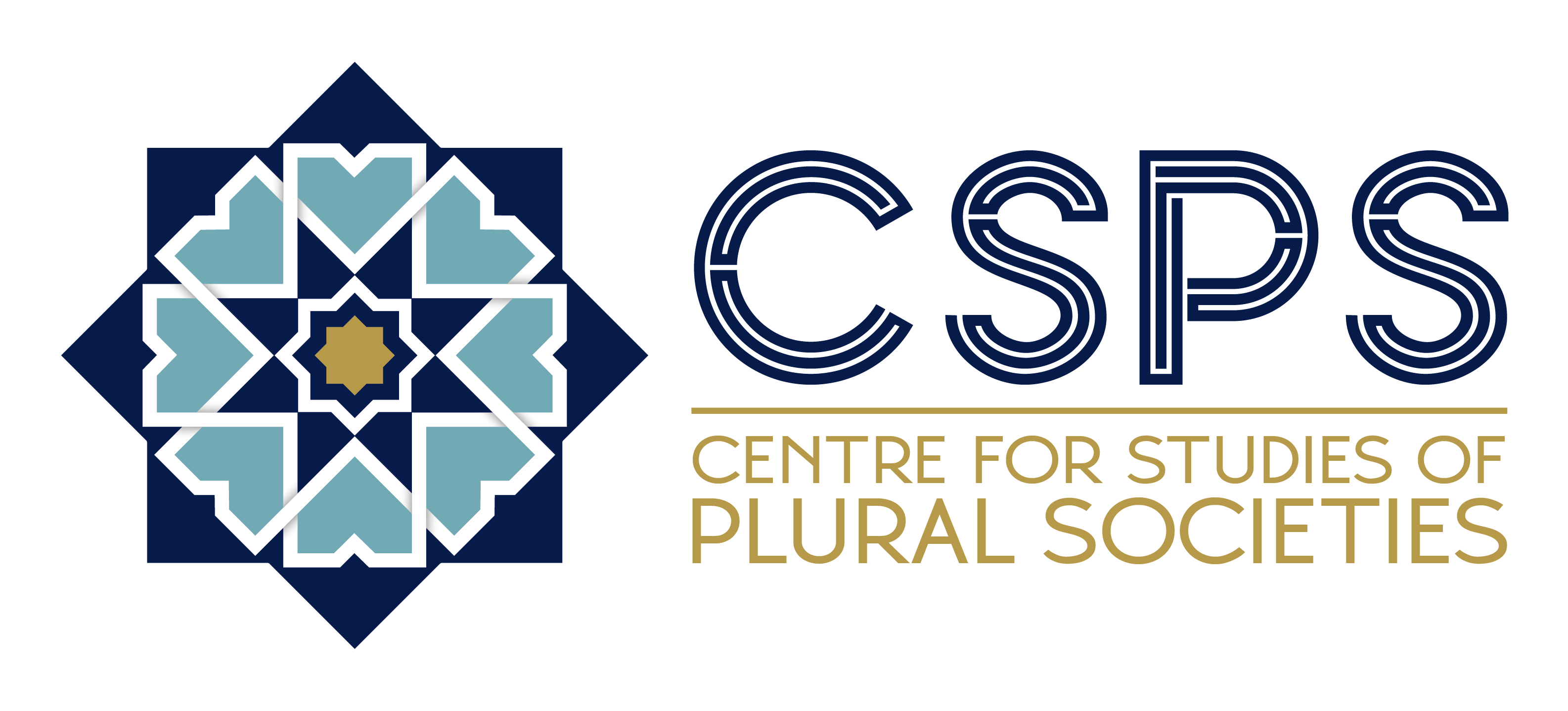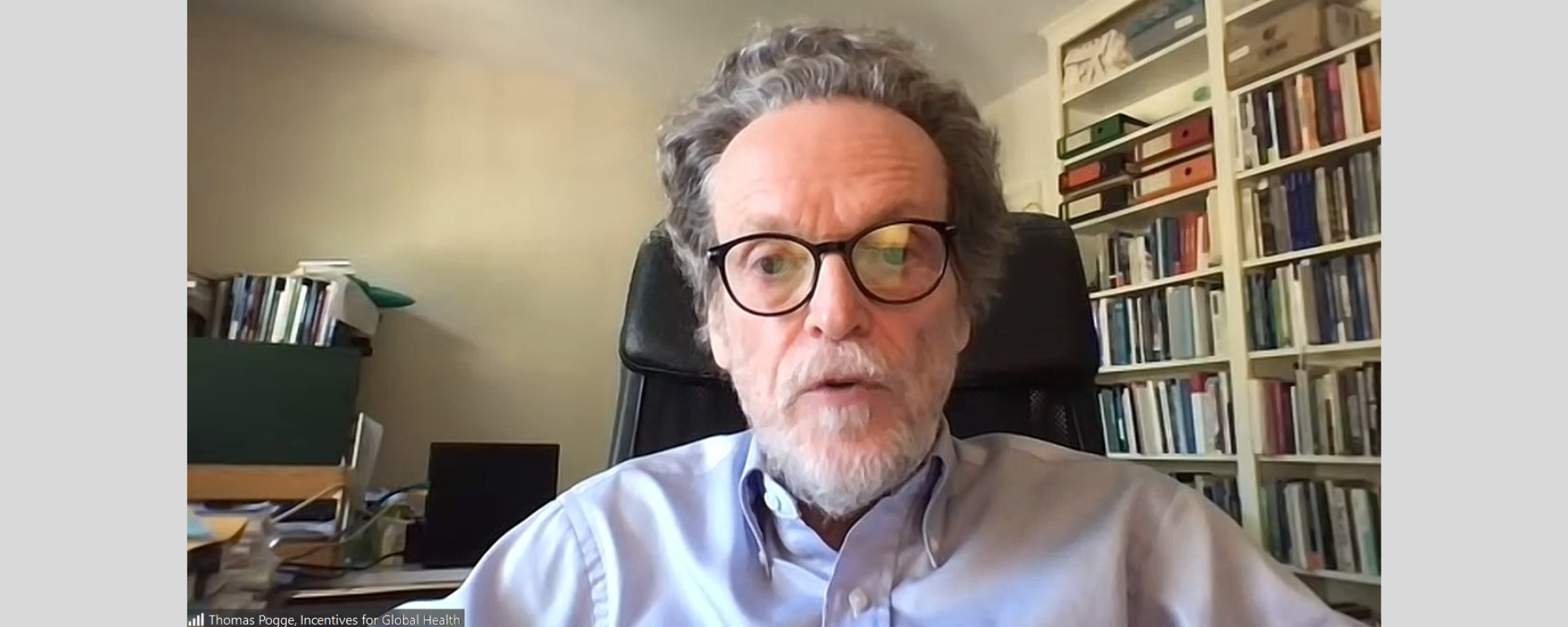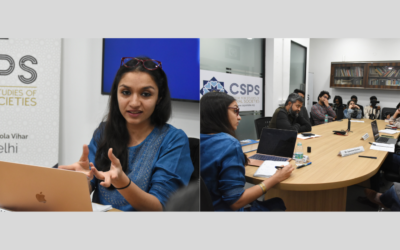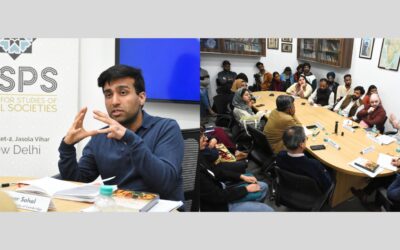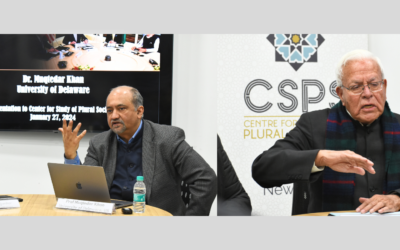The Centre for Studies of Plural Society, envisages the academic space, which is diverse and the one which can cater different and distinctive ideas and thoughts. In this light and spirit, the Centre organised a lecture by the distinguished Prof. Thomas Pogge on the topic ” Human Rights and Cultural Diversity”, chaired by Prof. Ashok Acharya. This lecture was hosted on Zoom. Dr. Sheeba Naaz expressed her gratitude towards them for accepting the invitation and briefed the guests and the participants about the organisation, its goals and objectives.
Prof. Pogge started by stating that he spent his summer in China and Korea, so his lecture on “Human Rights and Cultural Diversity” might be coloured by the experiences over there. He starts his lecture by first deliberating on how the moral conditions of the Humans are. Scholars and academicians do argue that the western part of the world did witness a great deal of improvement after the Industrial Revolution around two hundred years ago. But there lies a threat to the gains of the past, if the world does not take collective measures to preserve and improve it. The quest for sustainable development is yet to be approached in the manner and ways as demanded by the present circumstances. The basic rights to the humans being guaranteed by the International Bill of Rights cannot be realised, until and unless the people are guaranteed peace, food, adequate housing and are secured from the threat emanating from the actions of the state parties against each other. Even after decades we have not succeeded in securing these basic rights. Prof. Pogge stated that we have not achieved a Global Governance Institution that can fairly take account of the needs of all. Despite the fact that the world is doing fairly well in the field of technology, economic, and administrative capabilities, the realm of human rights is yet to be achieved fully.
But why are we doing so poorly? In response to this question, Prof. Pogge first briefly explains the arguments related to the diverse cultural response and approach towards human rights. Stating that different cultures have different ways of approaching human rights and the present rights or the rights enshrined in the International Bill of Rights are inconsistent to theirs. Since every state enjoys sovereignty, they should not be compelled to accept those “universal rights” which are inconsistent to their cultures. The proponents of cultural diversity also argue that the western world has been at a better place and pace when it comes to following and respecting the principles of human rights. Somewhere down the line, they try to project the non- western world as the cause of turbulence in terms of human rights. Prof. Pogge is not of this opinion. He objected to the Cultural Diversity argument. As per him, the cultural diversity explanation is promoted as a smokescreen by the privileged elites to maintain their status quo.
Prof. Pogge proposes focusing upon substantive and procedural reforms that are universally recognised as morally required to improve the condition of the weakest. Such reforms should either put no or very little cost on the strong, so that they do not have a sense of threat or vulnerability towards their status quo. In order to achieve it, he advocates establishing a United Nations Parliamentary Assembly, which is different from the United Nations General Assembly. In UNPA, the citizens of the member states have to elect their representative, not being nominated or appointed by the executive of the member states. This shall bring a change as the citizens shall become the part of decision making at the international level as well. This as per him shall enable every culture in the process of decision making and securing the human rights and achieving the basic rights.
After the detailed presentation by Prof. Pogge, Dr. Sheeba thanked him for this informative presentation and was followed by questions and answers. The participants raised their concerns regarding funding of the proposed institutions, Refugees and asylum seekers particularly Rohingya’s, growing influence of right wing around the world, institution of state and civil spaces.
The Chair, Prof. Acharya who has followed the works of the speaker very closely stated that the topic chosen by him is distinctive from the earlier ones. Expressing his opinion he stated that cultural diversity cannot be the excuse by the states to get away with the idea of world order and global justice. He said that even at the time when Human Rights was criticised as a Western construct and idea, there were some who argued for the moral basis of Human Rights, the human dignity, the common minimal principle. He appreciated the timing of the United Nations Parliamentary Assembly as the supra national institutes are already captured by the dominant states.
About the speaker:
Prof. Thomas Pogge: Prof. Pogge received his Doctoral Degree from Harvard University under the supervision of John Rawls. He is currently the Leitner Professor of Philosophy and Professor of Political Science at the University of Yale and founding Director of the Global Justice Program at Yale. He has served as a member of the Expert Group on Global Climate Change Obligations of Enterprises, which drafted the Principles on Climate Obligations of Enterprises and Expert Group on Global Climate Obligations, which drafted the Oslo Principles On Global Climate Obligations. He was the chair of the Task Force which published the report of the International Bar Association’s Human Rights Institute Task Force on Illicit Financial Flows, Poverty and Human Rights He has widely published on Rawls, Kant, philosophy and human rights. He is a member of the Norwegian Academy of Science as well as co-founder of Academics Stand Against Poverty (ASAP). His recent publications includes, World Poverty and Human Rights (2nd edn, Polity 2023); contributed in Debating Cosmopolitics (Verso, 2020); Designing in Ethics, co-edited, (Cambridge 2017); Health Rights (The International Library of Essays on Rights), co-edited, (Routledge 2017); Absolute Poverty and Global Justice: Empirical Data – Moral Theories – Initiatives (Law, Ethics and Economics), co-edited, (Routledge 2016); Poverty and the Millennium Development Goals: A Critical Look Forward (International Studies in Poverty Research), co- edited, (Zed Books 2016); Global Tax Fairness, co-edited (Oxford 2016); Politics as Usual (Polity 2010); Kant, Rawls, and Global Justice (Chinese), (Shanghai Translation Press 2010); Hacer Justicia a la Humanidad, (Fondo de Cultura Económica (FCE) 2009); World Poverty and Human Rights (2nd edn, Polity 2008); Global Justice and Global Ethics, co-edited, (Paragon House 2008); The Health Impact Fund, co-authored with Aidan Hollis (2008); John Rawls: His Life and Theory of Justice (Oxford 2007); and Freedom from Poverty as a Human Right, edited, (Oxford & United Nations Educational, Scientific and Cultural Organization (UNESCO) 2007).
About the chair:
Prof. Ashok Acharya: Prof Acharya received his Doctoral degree from the University of Toronto. He was the Henry Hart Rice Visiting Professor in Global Justice, South Asian Studies, Political science and Philosophy, MacMillan Center, Yale University in the year 2012- 13. He was the Academic Director, Nyaya: Programme in Global Justice, funded by the British Council with institutional collaboration with the universities of Birmingham and Yale from 2013 to 2016. He is a Member, Global Board of Directors, Academics Stand Against Poverty. He was awarded the prestigious Birmingham-India Social Science Fellowship, University of Birmingham in 2012. He was the Visiting Fellow, Australian Social Science Academy, Australian National University, Canberra in 2007. He was the recipient of Canadian Commonwealth Scholarships. He was awarded the Indo-Canadian Association Fellowship and Doctoral Fellowship, Centre for International Studies at the University of Toronto. His recent publications include, Citizenship in a Globalizing World, (Pearson 2022); An Introduction to Political Theory, co-edited, (Pearson 2015).
The report is prepared by Sidratullah, research intern at CSPS.
